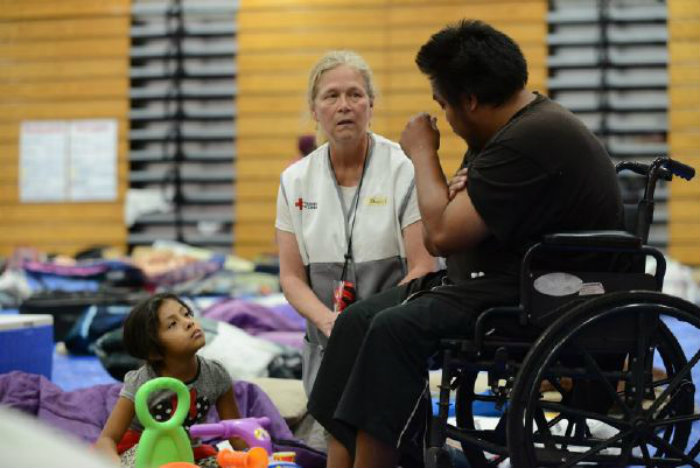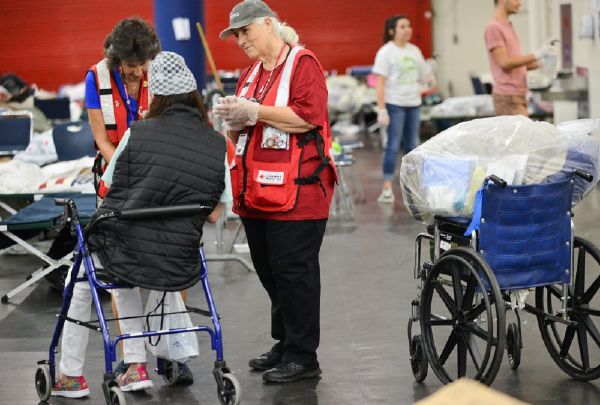Dealing with Disaster While Dealing with MS

American Red Cross shelter in Immokalee, FL, after Hurricane Irma destroyed most of that town. Photo by Daniel Cima for the American Red Cross

Are you ready for a disaster?
Wildfires in the wine country of Northern California exploded so quickly that survivors say they didn’t know they were threatened until flames were nearly at their doors. Hurricane Harvey forced more than 9,000 people into Houston’s main evacuation shelter. It was so crowded that many had to sleep on the floor. The September earthquake in Mexico was so violent and unexpected it forced Henry Rodríguez to run from his home with no shirt, socks, or the “go-bag” he keeps for an emergency, The New York Times reported. And Rodríguez should know better. He’s the head of Doctors Without Borders in Mexico.

Red Cross volunteer and hurricane evacuee with a walker in a Miami shelter. (Photo by Marko Kokic for The American Red Cross)
But some had extra problems to deal with. They were dragging canes or walkers, or maneuvering wheelchairs. As people with mobility problems, we need to do more than most folks to plan for a disaster. Here are a few things to know that may make things a little easier if a disaster lands on your doorstep.
Stay or go?
In Florida, where they know a thing or two about disasters, the state’s emergency management website says, “… your unique circumstances and the nature of the emergency should be carefully evaluated before either option is decided upon. As a person with disabilities/special needs or a caretaker of individuals with special needs, your disaster plan should consider and have options for both situations.”
If an evacuation isn’t mandatory and you decide to stay, officials recommend you keep at least a three-day supply of food and water (one gallon of water per day) on hand. In the Houston floods, however, some people were stuck in their homes for a week. The American Red Cross has an excellent, detailed guide about how someone with a disability should prepare for a disaster.
If you evacuate
The Red Cross is one of the disaster agencies that sets up evacuation centers. When a person with a disability comes to a Red Cross shelter, a worker will speak with them about their specific needs and how the Red Cross can help. That can include helping a person move from a wheelchair to a cot, cutting food, or navigating a cafeteria-style food service line. In many shelters, they can provide items such as shower stools, commode chairs, and a variety of cots that make shelters safe and comfortable for everyone.
In Florida, and perhaps some other states, there are shelters designed specifically for people who need extra help because of a medical condition, or need special supervision by a

Red Cross volunteers speak with a shelter resident in Houston, Texas. (Photo by Daniel Cima for The American Red Cross)
healthcare professional. But, you can’t just show up at a special needs shelter. In Florida, registration is required prior to an emergency, and a person with a disability must meet certain eligibility requirements. Those requirements can differ in various counties, so contacting emergency management officials in the state and county where you live before a disaster hits is a must-do.
Things to bring with you
According to the Red Cross, evacuation shelters typically are only meant to house people for 12-24 hours. These shelters may not have enough supplies to provide a cot and blanket for each person. So, shelter planners recommend you bring these items with you, if you can:
- Bedding (sleeping bag)
- Clothing (for several days)
- Medications and copies of prescriptions
- Your emergency kit (kit recommendations can be found on the Red Cross website).
Don’t bring:
- Alcoholic beverages
- Illegal drugs
- Weapons
- Pets (unless you’re going to a pet shelter)
In longer-term shelters, you may find more robust services, such as warm meals and a place to shower, but don’t expect these in a shelter that’s been set up quickly for a day or two.
“I would never count on a shelter having the supplies needed to manage a medical condition,” says Jeff Jellets, a territorial disaster director for the Salvation Army. “If you cannot sleep on the floor, for example, I would add a cot to my personal preparedness kit.”
“The key for anyone with special medical needs,” Jellets told me, “is to prepare for disaster situations now. No one knows your needs better than you do and, while shelter staff will almost always try to be helpful, they are unlikely to know exactly how best to meet your needs. You have to be prepared to educate shelter staff about your condition and how shelter staff can be helpful.”
You never can be too prepared, especially if you’re already dealing with the problems of MS. If you think “it’ll never happen here,” you’re not thinking.
You’re invited to follow my personal blog at: www.themswire.com.
***
Note: Multiple Sclerosis News Today is strictly a news and information website about the disease. It does not provide medical advice, diagnosis, or treatment. This content is not intended to be a substitute for professional medical advice, diagnosis, or treatment. Always seek the advice of your physician or other qualified health provider with any questions you may have regarding a medical condition. Never disregard professional medical advice or delay in seeking it because of something you have read on this website. The opinions expressed in this column are not those of Multiple Sclerosis News Today, or its parent company, Bionews Services, and are intended to spark discussion about issues pertaining to multiple sclerosis.







Leave a comment
Fill in the required fields to post. Your email address will not be published.